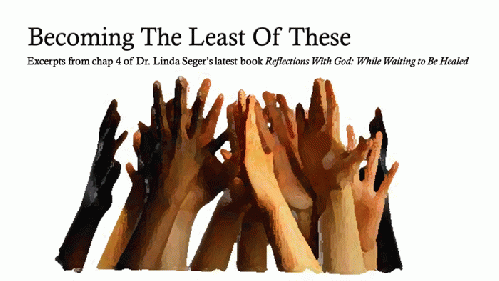"We might expect that the normal movement of our relationship with God is from being the least of these to being raised up and for God to exalt us, perhaps give us more power, perhaps give us more responsibility, perhaps give us more opportunities. We start life as being the smallest and we grow. We expect that same growth in our faith with our personal Walk with God. But when we have a medical problem, we often move from being in a more exalted position to becoming one of the least of these. We go from being whole to being broken. We go from being healthy to being sick. We go from people who are included to being excluded, either because we're not able to do the activities we did before or because our friends have forgotten about us or because we're not around in the way we used to be. We have doctors' appointments instead of going to a dance. We have therapies to do and can't just gather at any time for discussions far into the evening or for long dinners or for a weekend away.
In the Good Samaritan story (Luke 10:25-37), Jesus told the story to Jews about three people who are the "least of these." The story is about a man who had fallen among thieves, and lay by the side of the road, wounded and near death. All the people who should have helped him -a priest, a Levite - walked by him. A Samaritan - the people hated by Jews, stopped to help him. " Jesus recognized the Samaritan as the good neighbor. He told his listeners to do what the Samaritan did: to care for the hurt, the rejected, the forsaken.
But there is another layer of meaning that is interpreted by the theologian Karl Barth, which I find very meaningful, particularly in the midst of my own physical problems. Barth said, "Go and do likewise and be in need." Barth recognized that all of us are in need much like the man who has fallen among thieves. Yes, all of us--the rich, poor, educated, illiterate, the insiders or outsiders--we all stand in need. We are vulnerable. We are fragile. We are broken and need somebody who can come along and help make us whole. For some, this is hard to swallow--our humanness, our imperfection.
Many people intensely dislike being in need. We're taught to be independent and self-sufficient and to be our own person and not to have to rely on other people who might be unreliable. Yet there is a recognition in this story that the care the Good Samaritan gives, is the care that we all need.
I find it very helpful to recognize my human condition as being one of the least of these in need of being rescued. The man among thieves was probably not capable of reaching out to anyone or even moaning or crying for help. The situation demanded somebody notice him, and do something.
Sometimes when we're the least of these, we recognize we don't have the capability to call for help. Nor do we see anybody around us who would want to give us help. Certainly, if the man among thieves had looked up and been able to choose his savior, he would have chosen the Priest or the Levite and not the Samaritan.
But when we're in need, we might be surprised at the people who become the instruments of God. Perhaps our help comes from the nurse's aide who recently arrived from Honduras who has little education and speaks broken English, and yet she is the one who gives a smile and encouragement and the courage to carry on. Maybe it's your neighbor who you have rarely talked to because you don't think you have anything in common. And yet, this is the person who brings you food and that is better medicine for you than the prescription drugs.
When my sister, who had ALS, was in her final months, a black nurse assistant from Jamaica moved into their home. She became like a sister to my sister despite their different backgrounds. I thought the doctor who was a specialist would have been her great helper. But it was Dawn who was her angel. There was something so beautiful about their relationship and Dawn's devotion to my sister for these last six months. My sister insisted Dawn sit with our family at her funeral and we were all happy to have her as one of us.
We're often surprised by who is not acting as the instrument of God. I have gone to doctors who have nothing to offer me and didn't have a real concern about my condition. I had a doctor walk out of the room when I told him that I didn't want a Botox shot. He was terribly dismissive and even rude.
I have found help and concern and care from people whom ordinarily I would not expect. Many people I've met are wise and insightful, including other patients who might even be more broken than I am. Many of my screenwriting students and clients have had compassion and sometimes have made recommendations. We find when we're one of the least of these, we learn to open our hearts to help from whatever corner our help comes from.
Dr. Linda Seger is a script consultant, and an author of 9 books on screenwriting and 6 on spirituality. She has had dystonia since 2008 and had early stage breast cancer last year. Her two most recent books are related to the personal struggles she's had. These were excerpts from, her book Reflections. The Alphabet Prayer, co-written with her husband Peter Le Var, has also just been released. Both are available on her website here






